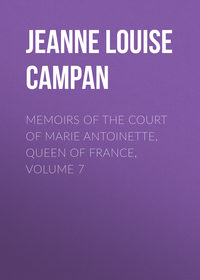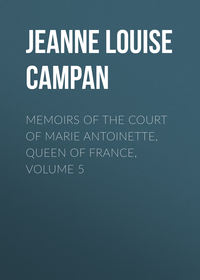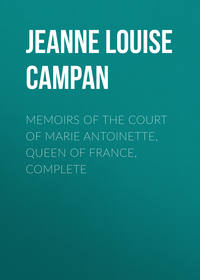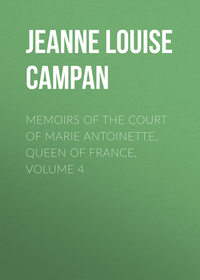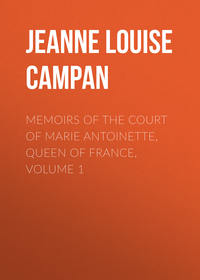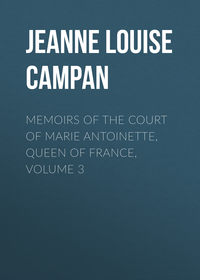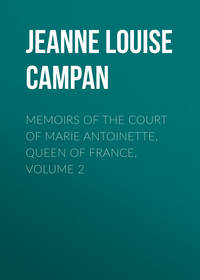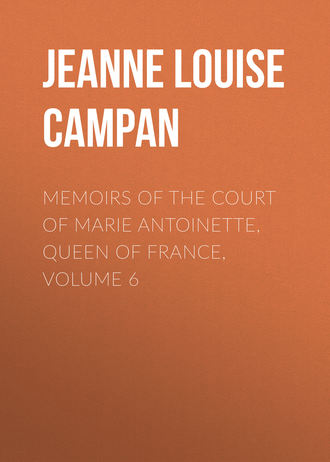 полная версия
полная версияMemoirs of the Court of Marie Antoinette, Queen of France, Volume 6
The King repaired to the chamber at mid-day. His speech was followed by plaudits which lasted several minutes. After the signing of the constitutional act all sat down. The President rose to deliver his speech; but after he had begun, perceiving that the King did not rise to hear him, he sat down again. His speech made a powerful impression; the sentence with which it concluded excited fresh acclamations, cries of "Bravo!" and "Vive le Roi!"—"Sire," said he, "how important in our eyes, and how dear to our hearts—how sublime a feature in our history—must be the epoch of that regeneration which gives citizens to France, and a country to Frenchmen,—to you, as a king, a new title of greatness and glory, and, as a man, a source of new enjoyment." The whole Assembly accompanied the King on his return, amidst the people's cries of happiness, military music, and salvoes of artillery.
At length I hoped to see a return of that tranquillity which had so long vanished from the countenances of my august master and mistress. Their suite left them in the salon; the Queen hastily saluted the ladies, and returned much affected; the King followed her, and, throwing himself into an armchair, put his handkerchief to his eyes. "Ah! Madame," cried he, his voice choked by tears, "why were you present at this sitting? to witness—" these words were interrupted by sobs. The Queen threw herself upon her knees before him, and pressed him in her arms. I remained with them, not from any blamable curiosity, but from a stupefaction which rendered me incapable of determining what I ought to do. The Queen said to me, "Oh! go, go!" with an accent which expressed, "Do not remain to see the dejection and despair of your sovereign!" I withdrew, struck with the contrast between the shouts of joy without the palace and the profound grief which oppressed the sovereigns within. Half an hour afterwards the Queen sent for me. She desired to see M. de Goguelat, to announce to him his departure on that very night for Vienna. The renewed attacks upon the dignity of the throne which had been made during the sitting; the spirit of an Assembly worse than the former; the monarch put upon a level with the President, without any deference to the throne,—all this proclaimed but too loudly that the sovereignty itself was aimed at. The Queen no longer saw any ground for hope from the Provinces. The King wrote to the Emperor; she told me that she would herself, at midnight, bring the letter which M. de Goguelat was to bear to the Emperor, to my room.
During all the remainder of the day the Chateau and the Tuileries were crowded; the illuminations were magnificent. The King and Queen were requested to take an airing in their carriage in the Champs-Elysees, escorted by the aides-decamp, and leaders of the Parisian army, the Constitutional Guard not being at the time organised. Many shouts of "Vive le Roi!" were heard; but as often as they ceased, one of the mob, who never quitted the door of the King's carriage for a single instant, exclaimed with a stentorian voice, "No, don't believe them! Vive la Nation!" This ill-omened cry struck terror into the Queen.
A few days afterwards M. de Montmorin sent to say he wanted to speak to me; that he would come to me, if he were not apprehensive his doing so would attract observation; and that he thought it would appear less conspicuous if he should see me in the Queen's great closet at a time which he specified, and when nobody would be there. I went. After having made some polite observations upon the services I had already performed, and those I might yet perform, for my master and mistress, he spoke to me of the King's imminent danger, of the plots which were hatching, and of the lamentable composition of the Legislative Assembly; and he particularly dwelt upon the necessity of appearing, by prudent remarks, determined as much as possible to abide by the act the King had just recognised. I told him that could not be done without committing ourselves in the eyes of the royalist party, with which moderation was a crime; that it was painful to hear ourselves taxed with being constitutionalists, at the same time that it was our opinion that the only constitution which was consistent with the King's honour, and the happiness and tranquillity of his people, was the absolute power of the sovereign; that this was my creed, and it would pain me to give any room for suspicion that I was wavering in it.
"Could you ever believe," said he, "that I should desire any other order of things? Have you any doubt of my attachment to the King's person, and the maintenance of his rights?"
"I know it, Count," replied I; "but you are not ignorant that you lie under the imputation of having adopted revolutionary ideas."
"Well, madame, have resolution enough to dissemble and to conceal your real sentiments; dissimulation was never more necessary. Endeavours are being made to paralyse the evil intentions of the factious as much as possible; but we must not be counteracted here by certain dangerous expressions which are circulated in Paris as coming from the King and Queen."
I told him that I had been already struck with apprehension of the evil which might be done by the intemperate observations of persons who had no power to act; and that I had felt ill consequences from having repeatedly enjoined silence on those in the Queen's service.
"I know that," said the Count; "the Queen informed me of it, and that determined me to come and request you to increase and keep alive, as much as you can, that spirit of discretion which is so necessary."
While the household of the King and Queen were a prey to all these fears, the festivities in celebration of the acceptance of the constitution proceeded. Their Majesties went to the Opera; the audience consisted entirely of persons who sided with the King, and on that day the happiness of seeing him for a short time surrounded by faithful subjects might be enjoyed. The acclamations were then sincere.
"La Coquette Corrigee" had been selected for representation at the Theatre Francais solely because it was the piece in which Mademoiselle Contat shone most. Yet the notions propagated by the Queen's enemies coinciding in my mind with the name of the play, I thought the choice very ill-judged. I was at a loss, however, how to tell her Majesty so; but sincere attachment gives courage. I explained myself; she was obliged to me, and desired that another play might be performed. They accordingly selected "La Gouvernante," almost equally unfortunate in title.
The Queen, Madame the King's daughter, and Madame Elisabeth were all well received on this occasion. It is true that the opinions and feelings of the spectators in the boxes could not be otherwise than favourable, and great pains had been taken, previously to these two performances, to fill the pit with proper persons. But, on the other hand, the Jacobins took the same precautions on their side at the Theatre Italien, and the tumult was excessive there. The play was Gretry's "Les Evenements Imprevus." Unfortunately, Madame Dugazon thought proper to bow to the Queen as she sang the words, "Ah, how I love my mistress!" in a duet. Above twenty voices immediately exclaimed from the pit, "No mistress! no master! liberty!" A few replied from the boxes and slips, "Vive le Roi! vive la Reine!" Those in the pit answered, "No master! no Queen!" The quarrel increased; the pit formed into parties; they began fighting, and the Jacobins were beaten; tufts of their black hair flew about the theatre.—[At this time none but the Jacobins had discontinued the use of hairpowder.—MADAME CAMPAN.]—A military guard arrived. The Faubourg St. Antoine, hearing of what was going on at the Theatre Italien, flocked together, and began to talk of marching towards the scene of action. The Queen preserved the calmest demeanour; the commandants of the guard surrounded and encouraged her; they conducted themselves promptly and discreetly. No accident happened. The Queen was highly applauded as she quitted the theatre; it was the last time she was ever in one!
While couriers were bearing confidential letters from the King to the Princes, his brothers, and to the foreign sovereigns, the Assembly invited him to write to the Princes in order to induce them to return to France. The King desired the Abbe de Montesquiou to write the letter he was to send; this letter, which was admirably composed in a simple and affecting style, suited to the character of Louis XVI., and filled with very powerful arguments in favour of the advantages to be derived from adopting the principles of the constitution, was confided to me by the King, who desired me to make him a copy of it.
At this period M. M–, one of the intendants of Monsieur's household, obtained a passport from the Assembly to join that Prince on business relative to his domestic concerns. The Queen selected him to be the bearer of this letter. She determined to give it to him herself, and to inform him of its object. I was astonished at her choice of this courier. The Queen assured me he was exactly the man for her purpose, that she relied even upon his indiscretion, and that it was merely necessary that the letter from the King to his brothers should be known to exist. The Princes were doubtless informed beforehand on the subject by the private correspondence. Monsieur nevertheless manifested some degree of surprise, and the messenger returned more grieved than pleased at this mark of confidence, which nearly cost him his life during the Reign of Terror.
Among the causes of uneasiness to the Queen there was one which was but too well founded, the thoughtlessness of the French whom she sent to foreign Courts. She used to say that they had no sooner passed the frontiers than they disclosed the most secret matters relative to the King's private sentiments, and that the leaders of the Revolution were informed of them through their agents, many of whom were Frenchmen who passed themselves off as emigrants in the cause of their King.
After the acceptance of the constitution, the formation of the King's household, as well military as civil, formed a subject of attention. The Duc de Brissac had the command of the Constitutional Guard, which was composed of officers and men selected from the regiments, and of several officers drawn from the National Guard of Paris. The King was satisfied with the feelings and conduct of this band, which, as is well known, existed but a very short time.
The new constitution abolished what were called honours, and the prerogatives belonging to them. The Duchesse de Duras resigned her place of lady of the bedchamber, not choosing to lose her right to the tabouret at Court. This step hurt the Queen, who saw herself forsaken through the loss of a petty privilege at a time when her own rights and even life were so hotly attacked. Many ladies of rank left the Court for the same reason. However, the King and Queen did not dare to form the civil part of their household, lest by giving the new names of the posts they should acknowledge the abolition of the old ones, and also lest they should admit into the highest positions persons not calculated to fill them well. Some time was spent in discussing the question, whether the household should be formed without chevaliers and without ladies of honour. The Queen's constitutional advisers were of opinion that the Assembly, having decreed a civil list adequate to uphold the splendour of the throne, would be dissatisfied at seeing the King adopting only a military household, and not forming his civil household upon the new constitutional plan. "How is it, Madame," wrote Barnave to the Queen, "that you will persist in giving these people even the smallest doubt as to your sentiments? When they decree you a civil and a military household, you, like young Achilles among the daughters of Lycomedes, eagerly seize the sword and scorn the mere ornaments." The Queen persisted in her determination to have no civil household. "If," said she, "this constitutional household be formed, not a single person of rank will remain with us, and upon a change of affairs we should be obliged to discharge the persons received into their place."
"Perhaps," added she, "perhaps I might find one day that I had saved the nobility, if I now had resolution enough to afflict them for a time; I have it not. When any measure which injures them is wrested from us they sulk with me; nobody comes to my card party; the King goes unattended to bed. No allowance is made for political necessity; we are punished for our very misfortunes."
The Queen wrote almost all day, and spent part of the night in reading: her courage supported her physical strength; her disposition was not at all soured by misfortunes, and she was never seen in an ill-humour for a moment. She was, however, held up to the people as a woman absolutely furious and mad whenever the rights of the Crown were in any way attacked.
I was with her one day at one of her windows. We saw a man plainly dressed, like an ecclesiastic, surrounded by an immense crowd. The Queen imagined it was some abbe whom they were about to throw into the basin of the Tuileries; she hastily opened her window and sent a valet de chambre to know what was going forward in the garden. It was Abbe Gregoire, whom the men and women of the tribunes were bringing back in triumph, on account of a motion he had just made in the National Assembly against the royal authority. On the following day the democratic journalists described the Queen as witnessing this triumph, and showing, by expressive gestures at her window, how highly she was exasperated by the honours conferred upon the patriot.
The correspondence between the Queen and the foreign powers was carried on in cipher. That to which she gave the preference can never be detected; but the greatest patience is requisite for its use. Each correspondent must have a copy of the same edition of some work. She selected "Paul and Virginia." The page and line in which the letters required, and occasionally a monosyllable, are to be found are pointed out in ciphers agreed upon. I assisted her in finding the letters, and frequently I made an exact copy for her of all that she had ciphered, without knowing a single word of its meaning.
There were always several secret committees in Paris occupied in collecting information for the King respecting the measures of the factions, and in influencing some of the committees of the Assembly. M. Bertrand de Molleville was in close correspondence with the Queen. The King employed M. Talon and others; much money was expended through the latter channel for the secret measures. The Queen had no confidence in them. M. de Laporte, minister of the civil list and of the household, also attempted to give a bias to public opinion by means of hireling publications; but these papers influenced none but the royalist party, which did not need influencing. M. de Laporte had a private police which gave him some useful information.
I determined to sacrifice myself to my duty, but by no means to any intrigue, and I thought that, circumstanced as I was, I ought to confine myself to obeying the Queen's orders. I frequently sent off couriers to foreign countries, and they were never discovered, so many precautions did I take. I am indebted for the preservation of my own existence to the care I took never to admit any deputy to my abode, and to refuse all interviews which even people of the highest importance often requested of me; but this line of conduct exposed me to every species of ill-will, and on the same day I saw myself denounced by Prud'homme, in his 'Gazette Revolutionnaire', as capable of making an aristocrat of the mother of the Gracchi, if a person so dangerous as myself could have got into her household; and by Gauthier's Gazette Royaliste, as a monarchist, a constitutionalist, more dangerous to the Queen's interests than a Jacobin.
At this period an event with which I had nothing to do placed me in a still more critical situation. My brother, M. Genet, began his diplomatic career successfully. At eighteen he was attached to the embassy to Vienna; at twenty he was appointed chief secretary of Legation in England, on occasion of the peace of 1783. A memorial which he presented to M. de Vergennes upon the dangers of the treaty of commerce then entered into with England gave offence to M. de Calonne, a patron of that treaty, and particularly to M. Gerard de Rayneval, chief clerk for foreign affairs. So long as M. de Vergennes lived, having upon my father's death declared himself the protector of my brother, he supported him against the enemies his views had created. But on his death M. de Montmorin, being much in need of the long experience in business which he found in M. de Rayneval, was guided solely by the latter. The office of which my brother was the head was suppressed. He then went to St. Petersburg, strongly recommended to the Comte de Segur, minister from France to that Court, who appointed him secretary of Legation. Some time afterwards the Comte de Segur left him at St. Petersburg, charged with the affairs of France. After his return from Russia, M. Genet was appointed ambassador to the United States by the party called Girondists, the deputies who headed it being from the department of the Gironde. He was recalled by the Robespierre party, which overthrew the former faction, on the 31st of May, 1793, and condemned to appear before the Convention. Vice-President Clinton, at that time Governor of New York, offered him an asylum in his house and the hand of his daughter, and M. Genet established himself prosperously in America.
When my brother quitted Versailles he was much hurt at being deprived of a considerable income for having penned a memorial which his zeal alone had dictated, and the importance of which was afterwards but too well understood. I perceived from his correspondence that he inclined to some of the new notions. He told me it was right he should no longer conceal from me that he sided with the constitutional party; that the King had in fact commanded it, having himself accepted the constitution; that he would proceed firmly in that course, because in this case disingenuousness would be fatal, and that he took that side of the question because he had had it proved to him that the foreign powers would not serve the King's cause without advancing pretensions prompted by long-standing interests, which always would influence their councils; that he saw no salvation for the King and Queen but from within France, and that he would serve the constitutional King as he served him before the Revolution. And lastly, he requested me to impart to the Queen the real sentiments of one of his Majesty's agents at a foreign Court. I immediately went to the Queen and gave her my brother's letter; she read it attentively, and said, "This is the letter of a young man led astray by discontent and ambition; I know you do not think as he does; do not fear that you will lose the confidence of the King and myself." I offered to discontinue all correspondence with my brother; she opposed that, saying it would be dangerous. I then entreated she would permit me in future to show her my own and my brother's letters, to which she consented. I wrote warmly to my brother against the course he had adopted. I sent my letters by sure channels; he answered me by the post, and no longer touched upon anything but family affairs. Once only he informed me that if I should write to him respecting the affairs of the day he would give me no answer. "Serve your august mistress with the unbounded devotion which is due from you," said he, "and let us each do our duty. I will only observe to you that at Paris the fogs of the Seine often prevent people from seeing that immense capital, even from the Pavilion of Flora, and I see it more clearly from St. Petersburg." The Queen said, as she read this letter, "Perhaps he speaks but too truly; who can decide upon so disastrous a position as ours has become?" The day on which I gave the Queen my brother's first letter to read she had several audiences to give to ladies and other persons belonging to the Court, who came on purpose to inform her that my brother was an avowed constitutionalist and revolutionist. The Queen replied, "I know it; Madame Campan has told me so." Persons jealous of my situation having subjected me to mortifications, and these unpleasant circumstances recurring daily, I requested the Queen's permission to withdraw from Court. She exclaimed against the very idea, represented it to me as extremely dangerous for my own reputation, and had the kindness to add that, for my sake as well as for her own, she never would consent to it. After this conversation I retired to my apartment. A few minutes later a footman brought me this note from the Queen: "I have never ceased to give you and yours proofs of my attachment; I wish to tell you in writing that I have full faith in your honour and fidelity, as well as in your other good qualities; and that I ever rely on the zeal and address you exert to serve me."
[I had just received this letter from the Queen when M. de la Chapelle, commissary-general of the King's household, and head of the offices of M. de Laporte, minister of the civil list, came to see me. The palace having been already sacked by the brigands on the 20th of June, 1792, he proposed that I should entrust the paper to him, that he might place it in a safer situation than the apartments of the Queen. When he returned into his offices he placed the letter she had condescended to write to me behind a large picture in his closet; but on the loth of August M. de la Chapelle was thrown into the prisons of the Abbaye, and the committee of public safety established themselves in his offices, whence they issued all their decrees of death. There it was that a villainous servant belonging to M. de Laporte went to declare that in the minister's apartments, under a board in the floor, a number of papers would be found. They were brought forth, and M. de Laporte was sent to the scaffold, where he suffered for having betrayed the State by serving his master and sovereign. M. de la Chapelle was saved, as if by a miracle, from the massacres of the 2d of September. The committee of public safety having removed to the King's apartments at the Tuileries, M. de la Chapelle had permission to return to his closet to take away some property belonging to him. Turning round the picture, behind which he had hidden the Queen's letter, he found it in the place into which he had slipped it, and, delighted to see that I was safe from the ill consequences the discovery of this paper might have brought upon me, he burnt it instantly. In times of danger a mere nothing may save life or destroy it.—MADAME CAMPAN.]
At the moment that I was going to express my gratitude to the Queen I heard a tapping at the door of my room, which opened upon the Queen's inner corridor. I opened it; it was the King. I was confused; he perceived it, and said to me, kindly: "I alarm you, Madame Campan; I come, however, to comfort you; the Queen has told me how much she is hurt at the injustice of several persons towards you. But how is it that you complain of injustice and calumny when you see that we are victims of them? In some of your companions it is jealousy; in the people belonging to the Court it is anxiety. Our situation is so disastrous, and we have met with so much ingratitude and treachery, that the apprehensions of those who love us are excusable! I could quiet them by telling them all the secret services you perform for us daily; but I will not do it. Out of good-will to you they would repeat all I should say, and you would be lost with the Assembly. It is much better, both for you and for us, that you should be thought a constitutionalist. It has been mentioned to me a hundred times already; I have never contradicted it; but I come to give you my word that if we are fortunate enough to see an end of all this, I will, at the Queen's residence, and in the presence of my brothers, relate the important services you have rendered us, and I will recompense you and your son for them." I threw myself at the King's feet and kissed his hand. He raised me up, saying, "Come, come, do not grieve; the Queen, who loves you, confides in you as I do."
Down to the day of the acceptance it was impossible to introduce Barnave into the interior of the palace; but when the Queen was free from the inner guard she said she would see him. The very great precautions which it was necessary for the deputy to take in order to conceal his connection with the King and Queen compelled them to spend two hours waiting for him in one of the corridors of the Tuileries, and all in vain. The first day that he was to be admitted, a man whom Barnave knew to be dangerous having met him in the courtyard of the palace, he determined to cross it without stopping, and walked in the gardens in order to lull suspicion. I was desired to wait for Barnave at a little door belonging to the entresols of the palace, with my hand upon the open lock. I was in that position for an hour. The King came to me frequently, and always to speak to me of the uneasiness which a servant belonging to the Chateau, who was a patriot, gave him. He came again to ask me whether I had heard the door called de Decret opened. I assured him nobody had been in the corridor, and he became easy. He was dreadfully apprehensive that his connection with Barnave would be discovered. "It would," said the King, "be a ground for grave accusations, and the unfortunate man would be lost." I then ventured to remind his Majesty that as Barnave was not the only one in the secret of the business which brought him in contact with their Majesties, one of his colleagues might be induced to speak of the association with which they were honoured, and that in letting them know by my presence that I also was informed of it, a risk was incurred of removing from those gentlemen part of the responsibility of the secret. Upon this observation the King quitted me hastily and returned a moment afterwards with the Queen. "Give me your place," said she; "I will wait for him in my turn. You have convinced the King. We must not increase in their eyes the number of persons informed of their communications with us."


